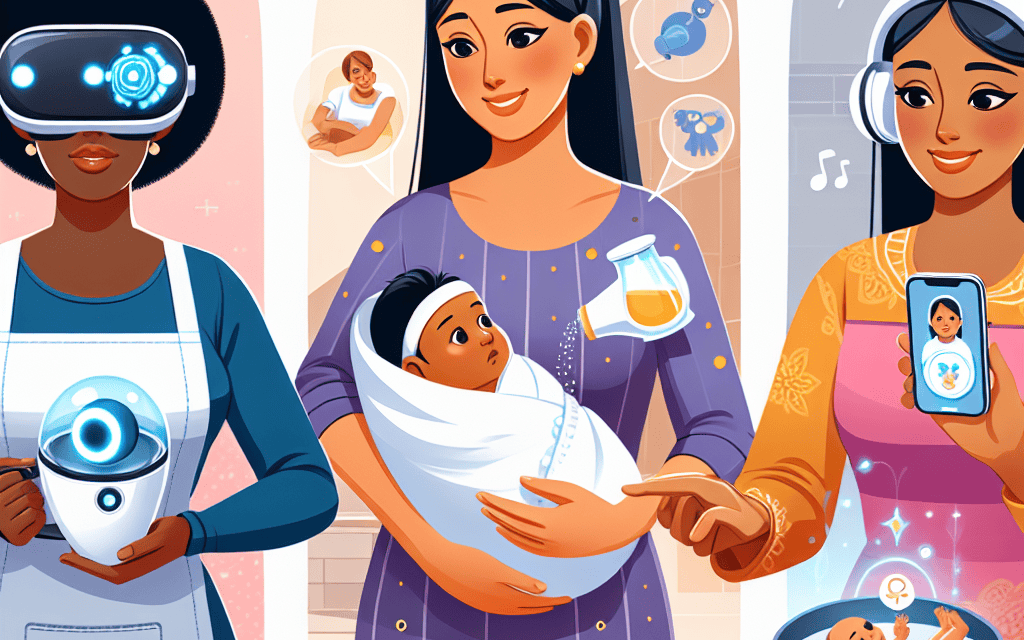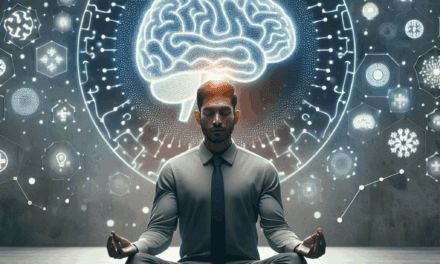Harnessing AI to Support New Mothers: Exploring Its Potential
The journey of motherhood is a transformative experience, filled with joy, challenges, and a steep learning curve. New mothers often find themselves navigating a myriad of responsibilities, from caring for their newborns to managing their own health and well-being. In recent years, artificial intelligence (AI) has emerged as a powerful tool that can provide support and resources tailored to the unique needs of new mothers. This article explores the potential of AI in various aspects of motherhood, including mental health support, personalized parenting advice, health monitoring, community building, and education. Each section delves into how AI can enhance the experience of new mothers, backed by research, case studies, and statistics.
Mental Health Support: Alleviating Postpartum Challenges
The transition to motherhood can be overwhelming, and many new mothers experience mental health challenges, including postpartum depression and anxiety. AI has the potential to play a significant role in identifying and addressing these issues early on.
Research indicates that approximately 15% of new mothers experience postpartum depression, which can have lasting effects on both the mother and child. AI-driven applications can help in several ways:
- Early Detection: AI algorithms can analyze data from various sources, such as social media activity, text messages, and even voice patterns, to identify signs of depression or anxiety. For instance, a study published in the journal Nature demonstrated that machine learning models could predict depressive symptoms based on linguistic patterns in social media posts.
- Personalized Interventions: AI can provide tailored mental health resources, such as guided meditations, cognitive behavioral therapy exercises, and mood tracking tools. Apps like Woebot use AI chatbots to engage users in therapeutic conversations, offering support and coping strategies.
- 24/7 Accessibility: Unlike traditional therapy, AI-driven mental health tools are available around the clock, allowing mothers to seek help whenever they need it. This accessibility can be crucial for those who may feel isolated or overwhelmed.
Case studies have shown promising results. For example, a pilot program using AI chatbots for postpartum support reported a 30% reduction in depressive symptoms among participants. By providing immediate support and resources, AI can help new mothers navigate their mental health challenges more effectively.
Personalized Parenting Advice: Tailoring Guidance to Individual Needs
Every mother’s journey is unique, and the advice that works for one may not be suitable for another. AI can offer personalized parenting advice based on individual circumstances, preferences, and cultural backgrounds.
AI-driven platforms can analyze data from various sources, including parenting styles, child development milestones, and even family dynamics, to provide customized recommendations. Here are some ways AI can enhance parenting advice:
- Data-Driven Insights: AI can analyze vast amounts of data from parenting forums, research studies, and expert opinions to deliver evidence-based advice. For instance, apps like BabyCenter use AI to provide personalized content based on the baby’s age and developmental stage.
- Adaptive Learning: AI systems can learn from user interactions, adapting their recommendations over time. This means that as a mother’s needs change, the advice she receives can evolve accordingly.
- Cultural Sensitivity: AI can be programmed to consider cultural differences in parenting practices, ensuring that the advice provided is relevant and respectful of diverse backgrounds.
For example, a study conducted by the University of California found that mothers who used AI-driven parenting apps reported feeling more confident in their parenting decisions. By receiving tailored advice that resonates with their unique situations, mothers can make informed choices that benefit both themselves and their children.
Health Monitoring: Ensuring Well-Being for Mother and Baby
The health of both mother and baby is paramount during the postpartum period. AI can assist in monitoring health metrics, providing timely interventions, and promoting overall well-being.
Wearable technology and mobile health applications are at the forefront of this revolution. Here’s how AI is transforming health monitoring for new mothers:
- Real-Time Health Tracking: Wearable devices can monitor vital signs, sleep patterns, and physical activity levels. AI algorithms can analyze this data to identify potential health issues, such as sleep deprivation or elevated stress levels, and alert the user or healthcare provider.
- Predictive Analytics: AI can use historical health data to predict potential complications, such as postpartum hemorrhage or preeclampsia. By identifying risk factors early, healthcare providers can intervene proactively.
- Telehealth Integration: AI can facilitate telehealth consultations, allowing new mothers to connect with healthcare professionals without the need for in-person visits. This is particularly beneficial for those with mobility issues or those living in remote areas.
A case study involving a telehealth platform that integrated AI for postpartum care reported a 40% increase in follow-up appointments among new mothers. By making healthcare more accessible and responsive, AI can significantly improve health outcomes for both mothers and their infants.
Community Building: Fostering Connections Among New Mothers
The experience of motherhood can often feel isolating, especially for first-time mothers. AI can help build supportive communities that connect new mothers with one another, fostering relationships and sharing experiences.
Online platforms and social media groups have become popular spaces for mothers to seek advice and share their journeys. Here’s how AI can enhance community building:
- Smart Matching: AI algorithms can analyze user profiles and interests to connect mothers with similar experiences or challenges. This can lead to more meaningful interactions and support networks.
- Content Moderation: AI can help maintain a positive and supportive environment by moderating discussions and filtering out harmful content. This ensures that online communities remain safe spaces for mothers to share their thoughts and feelings.
- Resource Sharing: AI can facilitate the sharing of resources, such as local support groups, parenting classes, and mental health services, making it easier for mothers to access the help they need.
A notable example is the app Peanut, which uses AI to connect mothers based on shared interests and experiences. Users report feeling less isolated and more empowered through their connections with other mothers. By fostering community, AI can help new mothers build a support system that enhances their overall well-being.
Education: Empowering New Mothers with Knowledge
Education is a crucial component of successful parenting. AI can provide new mothers with access to a wealth of information tailored to their specific needs and preferences.
AI-driven educational platforms can offer a range of resources, from articles and videos to interactive courses. Here’s how AI is transforming education for new mothers:
- Personalized Learning Paths: AI can assess a mother’s knowledge level and learning preferences to create customized educational experiences. This ensures that mothers receive information that is relevant and engaging.
- Interactive Tools: AI can power interactive tools, such as virtual reality simulations or gamified learning experiences, making education more engaging and effective. For example, virtual reality can be used to simulate breastfeeding techniques or infant care scenarios.
- Continuous Updates: AI can keep educational content up-to-date with the latest research and guidelines, ensuring that mothers have access to the most current information.
A study conducted by the American Academy of Pediatrics found that mothers who engaged with AI-driven educational platforms reported feeling more prepared for parenting challenges. By empowering mothers with knowledge, AI can help them navigate the complexities of motherhood with confidence.
Conclusion: The Future of Motherhood with AI
The integration of AI into the lives of new mothers holds immense potential to enhance their experiences and well-being. From mental health support to personalized parenting advice, health monitoring, community building, and education, AI can provide valuable resources tailored to the unique challenges of motherhood.
As technology continues to evolve, it is essential to ensure that AI solutions are accessible, inclusive, and respectful of diverse cultural backgrounds. By harnessing the power of AI, we can create a supportive ecosystem that empowers new mothers, helping them thrive in their parenting journeys.
In summary, the key takeaways from this exploration of AI’s potential in supporting new mothers include:
- AI can provide early detection and personalized interventions for mental health challenges.
- Personalized parenting advice can enhance confidence and decision-making for new mothers.
- Health monitoring through AI can improve outcomes for both mothers and infants.
- AI can foster community connections, reducing feelings of isolation among new mothers.
- Educational resources powered by AI can empower mothers with knowledge and skills.
As we look to the future, the collaboration between technology and maternal health will be crucial in creating a supportive environment for new mothers, ultimately benefiting families and society as a whole.





